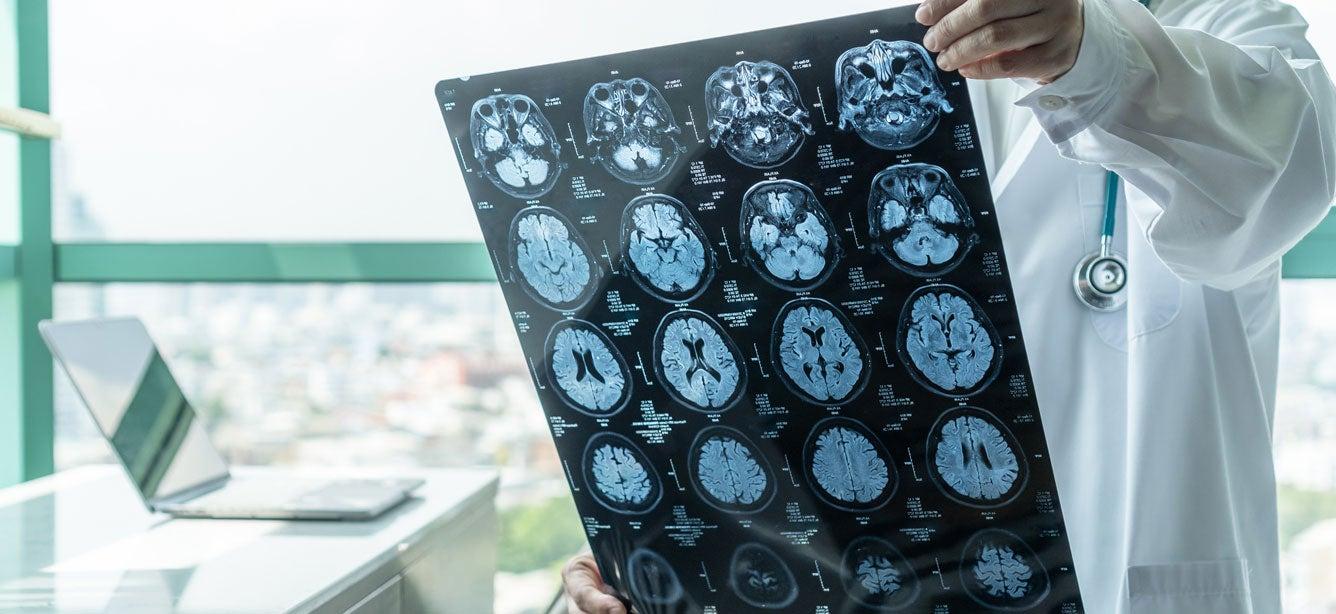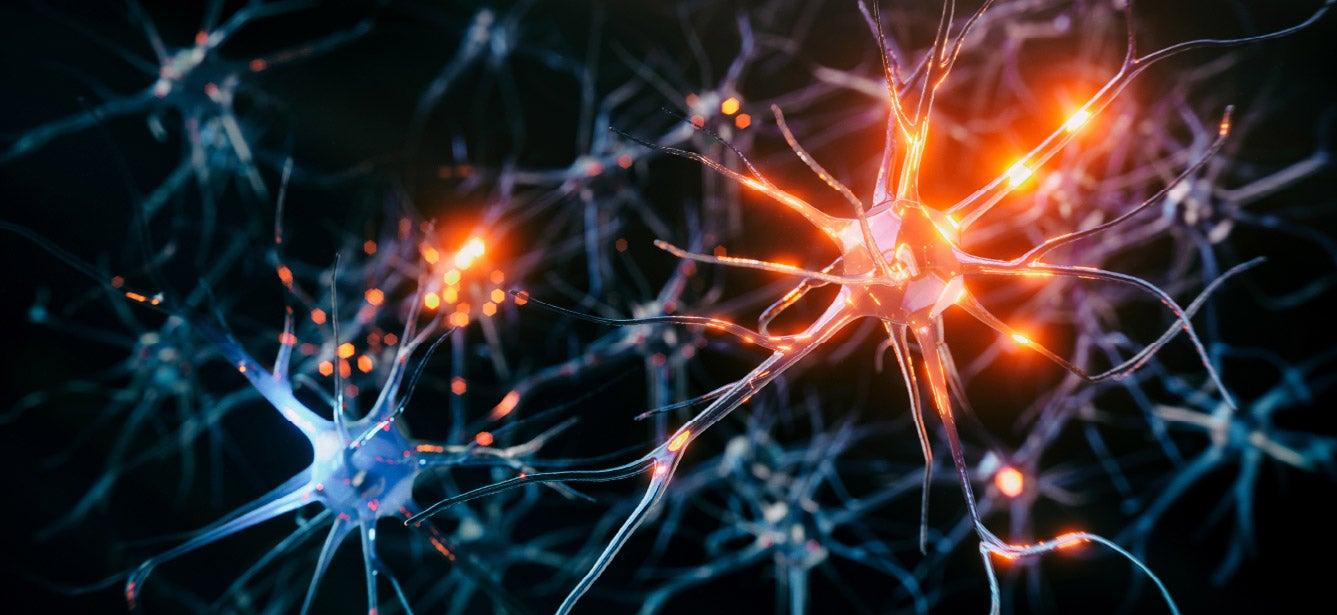
Related Topics
You've probably heard the terms “dementia” and “Alzheimer’s” being used interchangeably. While they are related, there are distinct differences between the two terms. Dementia is the umbrella term to describe a person's changes in memory, thinking, or reasoning. There are many possible causes of dementia, including Alzheimer’s disease.
What is Alzheimer’s disease?
Alzheimer’s is a progressive brain disease. It's also the most common cause of dementia, accounting for 60-80% of all dementia cases.1 According to the Centers for Disease Control and Prevention, 6.7 million Americans had Alzheimer’s disease in 2023—and that number could rise to 14 million people by 2060.2
Are there any treatments for Alzheimer's?
Research on Alzheimer’s treatments is ongoing. In 2021, aducanumab (Aduhelm™) was approved as a treatment for Alzheimer’s disease by the U.S. Food and Drug Administration (FDA). This was the first FDA-approved therapy to potentially delay decline from the disease, compared to current medications that only address symptoms. It was also the first therapy to demonstrate that removing amyloid from the brain may delay decline in people living with Alzheimer’s. Amyloid is the protein that clumps into sticky brain plaques that are a hallmark of Alzheimer’s disease. This means people may have more time to actively participate in daily life, have sustained independence, and hold on to memories longer.
Coverage of Aduhelm by Medicare and other insurers is still being determined, and its distribution and implementation are continually evolving. If you're interested in learning more about Aduhelm, talk to your health care provider to determine whether you are a candidate.
Leqembi™ (generic name lecanemab) is an even newer medication for Alzheimer’s, approved by the FDA in January 2023. Like Aduhelm, it is designed to treat patients in the early stages of the disease. In July 2023, the agency granted full approval of the drug, meaning Medicare will provide coverage as long as patients meet certain conditions.
Leqembi is only the second anti-amyloid treatment on the market.3 Already, it shows potential in reducing cognitive decline. However, it’s too soon to know whether the drug will remain effective over time. Ask your doctor whether Leqembi is an appropriate Alzheimer’s treatment for you or someone you know.
How do you diagnose Alzheimer's?
There's no one test that can be used to definitively diagnose Alzheimer's disease. Instead, doctors use a combination of medical history, neurological exams, brain imaging, and other diagnostic tools to make a diagnosis with as much accuracy as possible.
The approval of new therapies makes early detection and diagnosis of Alzheimer's even more critical, since it helps to ensure people receive the most benefit at the earliest point possible. Early diagnosis has demonstrated better health outcomes for patients and their caregivers.
It may be hard to know the difference between age-related changes and the first signs of dementia, but memory loss that disrupts daily life is not a typical part of aging. Your memory often changes as you grow older. Some people recognize concerning changes in themselves before anyone else notices. In other cases, friends and family are the first to observe changes in memory, behavior, or abilities.
What are some early symptoms of Alzheimer's? The Alzheimer’s Association has created a list of warning signs and contrasted them wtih typical age-related changes.
10 warning signs for Alzheimer’s disease and other dementias
1. Memory loss that disrupts daily life
One of the most common signs of Alzheimer’s disease, especially in the early stage, is forgetting recently learned information. Others include forgetting important dates or events, asking for the same questions over and over, and increasingly needing to rely on memory aids (e.g., reminder notes or electronic devices) or family members for things they used to handle on their own.
What’s a typical age-related change?
Sometimes forgetting names or appointments, but remembering them later
2. Challenges in planning or solving problems
Some people living with dementia may experience changes in their ability to develop and follow a plan or work with numbers. They may have trouble following a familiar recipe or keeping track of monthly bills. They may have difficulty concentrating and take much longer to do things than they did before.
What’s a typical age-related change?
Making occasional errors when balancing a checkbook
3. Difficulty completing familiar tasks at home, at work, or leisure
People living with Alzheimer's often find it hard to complete daily tasks. Sometimes they may have trouble driving to a familiar location, organizing a grocery list or remembering the rules of a favorite game.
What’s a typical age-related change?
Occasionally needing help to use the settings on a microwave or to record a television show
4. Confusion with time or place
People living with Alzheimer's can lose track of dates, seasons, and the passage of time. They may have trouble understanding something if it is not happening immediately. Sometimes they may forget where they are or how they got there.
What’s a typical age-related change?
Getting confused about the day of the week, but figuring it out later
5. Trouble understanding visual images and spatial relationships
For some people, having vision problems is a sign of Alzheimer's. This may lead to difficulty with balance or trouble reading. They may also have problems judging distance and determining color or contrast, causing issues with driving.
What’s a typical age-related change?
Vision changes related to cataracts
6. New problems with words in speaking or writing
People living with Alzheimer's may have trouble following or joining a conversation. They may stop in the middle of a conversation and have no idea how to continue or they may repeat themselves. They may struggle with vocabulary, have trouble naming a familiar object or use the wrong name (e.g., calling a "watch" a "hand-clock").
What’s a typical age-related change?
Occasionally having trouble finding the right word
7. Misplacing things and losing the ability to retrace steps
Early symptoms of Alzheimer's may include putting things in unusual places. Someone may lose things and be unable to go back over their steps to find them again. They may accuse others of stealing, especially as the disease progresses.
What’s a typical age-related change?
Misplacing things from time to time and retracing steps to find them
8. Decreased or poor judgment
People living with Alzheimer’s may experience changes in judgment or decision-making. For example, they may use poor judgment when dealing with money or pay less attention to grooming or keeping themselves clean.
What’s a typical age-related change?
Making a bad decision once in a while
9. Withdrawal from work or social activities
Another sign of Alzheimer’s progression is when someone experiences changes in their ability to hold or follow a conversation. As a result, they may withdraw from hobbies, social activities, or other engagements.
What’s a typical age-related change?
Feeling weary of work, family, and social obligations every so often
10. Changes in mood and personality
People living with Alzheimer’s may experience mood and personality changes. They can become confused, suspicious, depressed, fearful, or anxious. They may be easily upset at home, with friends or when out of their comfort zone.
What’s a typical age-related change?
Developing very specific ways of doing things and becoming irritable when a routine is disrupted
Stay ahead of Alzheimer's progression with early detection
These warning signs are intended help you identify problems in memory, thinking, or behavior that may be related to Alzheimer’s or another dementia. People may experience one, all or some of these signs in varying degrees, and in numerous or single occurrences. They do not have to experience all symptomes for there to be concern.
If you’re seeing any changes in memory, thinking, or behavior—in either yourself or someone else—it’s important to talk to a doctor as soon as possible. Early detection allows for timely intervention and management strategies that can slow Alzheimer's progression and enable a good quality of life for as long as possible. It also gives patients and their families the opportunity to plan for and make informed decisions about future care.
Sources
1. Alzheimer’s Association. Alzheimer’s Disease Facts and Figures. Found on the internet at https://www.alz.org/media/Documents/alzheimers-facts-and-figures.pdf
2. Centers for Disease Control and Prevention. About Alzheimer’s Disease. Found on the Internet at https://www.cdc.gov/aging/alzheimers-disease-dementia/about-alzheimers.html
3. Alzheimer’s Association. Treatments and Research. Found on the internet at https://www.alz.org/help-support/i-have-alz/treatments-research


